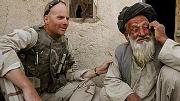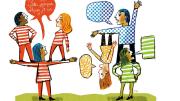Saturday morning I awoke to hear that Qalat, the capital of Zabul Province, had fallen to the Taliban. It surprised me, only because I would have expected Qalat to just declare Taliban rule. It was in Qalat, the nastiest place I have ever been in my life, in December 2002, that I first questioned whether Afghanistan's destiny could actually be changed in our lifetime.
I was part of a unit that was helicoptered into Qalat early one morning to look for Al Qaeda, Taliban, and surface-to-air missiles. As we searched through the governor's compound, we found hordes of humanitarian aid—donations of clothes and blankets that could have been put to good use in the mountain villages to shield Afghans against the winter cold—being repackaged for profit in the Pakistani markets across the border. My interpreter and I found the governor and took him to his office for an interrogation. He was a weak, cowardly man sacrificing his own people for profit with little remorse, and I left the interrogation sickened.
The next day, as we swept through the villages of Zabul Province searching for Al Qaeda and Taliban, the people we spoke with complained about how the governor would send his men to the villages to photograph the young boys. The governor would pick the photos he liked, and his men would return to the villages the following day to retrieve his human selections. As I heard village leader after village leader tell the same story over days of our operation, I felt a mounting rage, thinking maybe the governor should be assigned to the other side of the war's ledger of the living and dying.
During recent days, my phone has buzzed with calls and texts from civilian friends, surprised that the wheels could come off the bus so fast in Afghanistan.
I reply the same way:
It's not surprising. It was always going to be this way.
Any American soldier who spent significant time in the villages knows this. By “significant,” I mean time spent talking to village elders, trying to secure them against Taliban terror, feed their hungry children, evangelize the advantages of education for all, and explain the rule of law. I mean those of us who spent time in those villages sorting through feudal fighting that for generations has focused Afghans not on their future but the wrongs of the past. At Harvard, I have watched a parade of generals visit the Kennedy School, detailing the need for more troops to stabilize the nation. From my own time on the ground, I’ve come away with another view.
Afghanistan may not be a nation to be stabilized. It is a diverse and difficult space with little sense of collective or shared fate. Illiteracy is still endemic, even after our intervention—as is the ceaseless violence. And the idea of a centralized executive leadership on the Western model, with its hierarchical architectures and responsibilities, with occasional exceptions, is just antithetical to Afghans. At least that is the history.
And yet despite being at war for centuries, Afghans are neither defeated by nor do they defeat their invaders. Rather, Afghanistan has been abandoned by invaders dating back to Genghis Khan. No matter the magnitude and duration of the invasion, Afghanistan remained unchanged in key ways.
When I got to Afghanistan in 2002, the most high-tech widget I saw in the rural villages of Kandahar Province was an AK-47. The second most? The wheel. The villages were roughly out of the twelfth century. When I returned for subsequent deployments in 2009 and 2011, I saw that there had been an infusion of cell phones, internet cafes, paved roads, media, and more that we, the Coalition, had facilitated through aid and commerce. But the Afghans had no organic capacity to develop or sustain these trappings of twenty-first-century society, and the powers-that-be in the Coalition continued to largely ignore this fact. Watching the deployment of sophisticated helicopters and other equipment to the Afghan National Army left me with a sense of dread and anger—at our miscalculation that our modern “toys” would somehow “fix” Afghanistan.
One afternoon in 2009, I sat in a briefing at Forward Operating Base Shank in Logar Province. Eager 30-somethings sent by the State Department were visiting from the U.S. embassy in Kabul to present their plan for Logar and Wardak Provinces, just south of the nation’s capital. Outfitted in brightly colored Patagonia and North Face gear, these fashionably coiffed, well-intentioned young people walked through a PowerPoint presentation of a vision of the region, one of the most violent in Afghanistan, as a modern-day Nirvana. I watched the slide presentation in disbelief, as nothing in it registered with the realities of the Afghanistan I was seeing. As I looked around the meeting table, many of the officers and senior noncommissioned officers, soldiers with multiple combat tours, shaved heads, cups of tobacco spit, sunflower seed shells and coffee on the plywood table in front of them, were incredulous. The brigade operations officer held his head in both hands, unable to look at the slides or the self-assured presenters. Others stared between their fingers as they pressed their hands against their faces. The brigade sergeant major looked angry. The brigade civil affairs officer stared in disbelief of the naivete the presentation communicated.
But I knew what this was. I was, at the time, straddling two worlds. Deployed in Afghanistan, but an engineering professor at Harvard, I felt acutely the pull between two worlds—one that was on the ground, and one in the clouds. Immediately after their presentation, I invited the half dozen or so speakers back to my shared office in the shack. Behind the closed door, I asked how many had graduated from the Harvard Kennedy School. Most had. One was from Princeton. I thanked them for their time before gently escorting this ultraviolet good-idea choir to the helicopter that would take them back to the embassy.
That singular episode has had a greater impact on my teaching at Harvard than any other in my life.
Did we, as a nation, misunderstand Afghanistan? Yes. For those of us on the ground, we understood exactly how this would end from almost the beginning. It wasn’t so much the poverty, lack of education, or societal values. It was simpler than that. For the largest portion of the Afghan population, there was no buy-in to the concept of “Live free or die.” As we’ve done elsewhere, we tried to force a cultural narrative on a people with their own narrative and their own culture.
But our greatest failure was not understanding and challenging ourselves. Not asking the hard questions about why democracy works, nor choosing to serve the nation in a sustained effort that would endow us with a deeper understanding of our culture and values. We didn’t appreciate what it takes to build and support a law enforcement officer, what it takes to support commerce, or get electricity into your house. Finally, we failed to appreciate what it takes to build a citizen of democracy, a citizen who may need to be developed into a leader. In the end, our effort at nation-building in Afghanistan was flawed by an arrogance and lack of understanding of both ourselves and the Afghans.
What is the lesson going forward? Challenge the cultural narrative we hold in such high esteem and ask questions about it—especially for the military which is so often sent out into the world armed with the American Narrative. Specifically, the military must reconsider the careerist model of building generals who, seemingly disconnected from the pulse of the American populace, built a warring pyramid scheme over two decades based on a fantasy where money was a weapon system. And for us in academia, the burden is to recognize that our special, rarified place should be a battlefield of its own, where ideas should do battle and hard, uncomfortable questions should be asked.
We may be soon out of Afghanistan, but our best course of action going forward is to keep the running tab open. If terror should again leak from its borders, the terrorists can bet that our response will be something other than nation-building.









